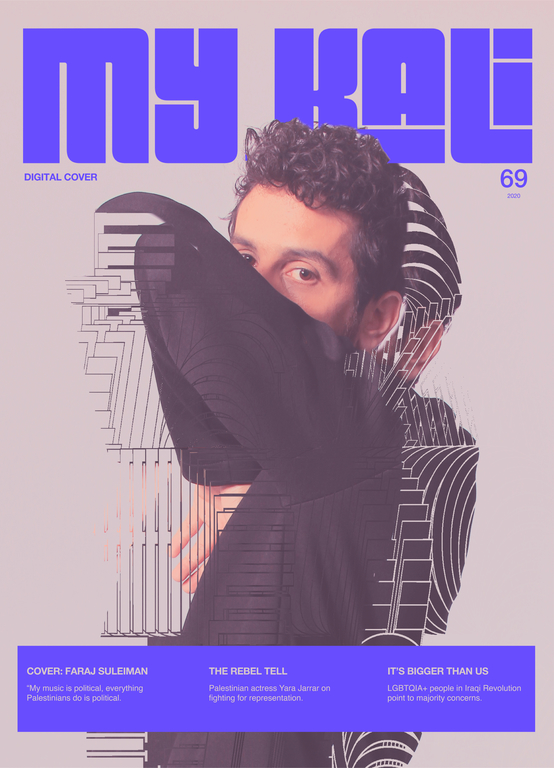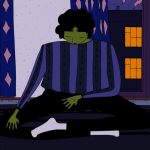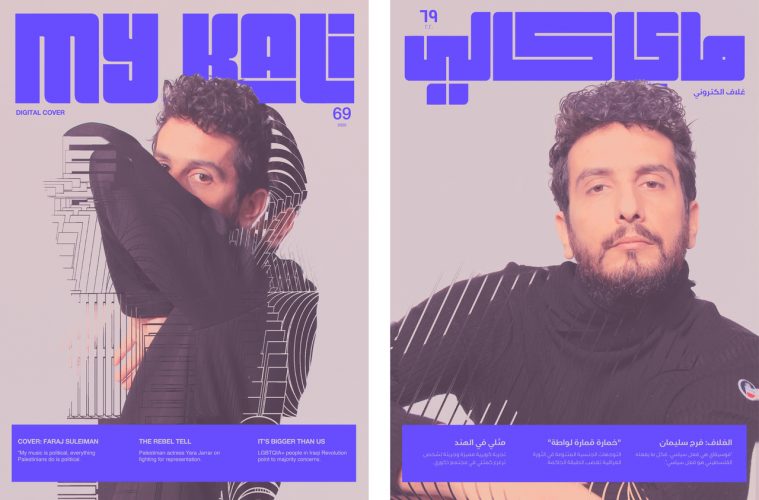This issue features Palestinian artist/singer/musician Faraj Suleiman, pictured on this issue’s cover. Journalist Nazeeha Saed sat down with Faraj to chat about his music, his childhood memories, and the connections between them.
Writer, Salama Al Dib, presents an opinion piece on men’s hegemony and patriarchy in the music industry, focusing on Egyptian icon/artist/singer Ruby as her prime example. She unpacks the choice female artists are often forced to make in such power dynamics, between promoting their looks or their vocal skill, looking particularly at representations of female artists as seductress icons who pleasure the gaze for the male gaze in video clips. (soon)
Considering five interviews with members of the LGBTQIA+ community who have participated in the Iraqi revolution, writer and My.Kali editor, Musa Shadeedi, discusses the 2019-2020 revolution within a queer feminist intersectional lens, and attempts of Iraqi government to undermine the revolution’s legitimacy by labeling it protesters as “prostitutes and homosexuals.” The article discusses SOGI diversity and engagement within the revolution, and how SOGI people empowered the revolution and stood against a patriarchal and sectarianism government. (soon)

On the cover: Singer/Musician Faraj Suleiman. Photographed by: Zara Naber. Creative Direction Khalid Abdel-Hadi. Cover design by: Mohammed Moe Mustafa
As part of her interview series, emerging storyteller, Shusha, interviews an Iraqi man living with HIV. He tells us about his life before his diagnosis, how his life has changed since, who stood by him, and challenges he is facing regarding access to treatment, interactions with medical professionals, financial exploitation, and medical ethics. (soon)
Syrian feminist researcher and writer, Reem Mahmoud, writes about the struggles of women subjected to gender based violence (GBV) because they rejected a man, broken off a relationship, or simply said NO. She questions how society can be so tolerant toward such violence, and the role of the entertainment industry, music, and film in perpetuating such ideologies. (soon)
Finally, recurring photographer and pop culture enthusiast, Shukri Lawrence, interviews Yara Jarrar, a Palestinian up-and-coming actress, to learn more about her journey as an artist, unequal representations on-screen, and her personal experience with the occupation.
This Dossier/issue and structure arranged by the My.Kali editors. Proof-read by Eliza Marks
Content
 Cover: Faraj Suleiman
Cover: Faraj Suleiman
“My music is political, everything Palestinians do is political”

The Rebel Tell
Palestinian actress Yara Jarrar on fighting for representation
 Intibint
Intibint
Subverting attitudes towards Arab girl stereotypes through art and music
 The Contradicting Case of Sofia Talouni
The Contradicting Case of Sofia Talouni
Can we sympathize with an LGBTQIA+ person who caused so much harm to their community?
 “That’s What You Get For Saying ‘No'”
“That’s What You Get For Saying ‘No'”
When women say ‘No’ to Men
 Living With HIV:
Living With HIV:
When Doctors Take Advantage Of Your Disease

